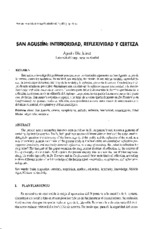Mostrar el registro sencillo del ítem
San Agustín: interioridad, reflexividad y certeza
| dc.contributor.author | Uña Juárez, Agustín | |
| dc.date.accessioned | 2022-05-30T10:06:09Z | |
| dc.date.available | 2022-05-30T10:06:09Z | |
| dc.date.issued | 2001 | |
| dc.identifier.issn | 1133-0902 | |
| dc.identifier.issn | 2530-7878 | |
| dc.identifier.uri | http://hdl.handle.net/10396/23000 | |
| dc.description.abstract | Este articulo investiga dos problemas principales en los conocidos argumentos de San Agustín en pro de Ia certeza, contra los escépticos. En realidad, son mas bien dos niveles de una misma cuestión «metodológica»: Ia interioridad del conocimiento (y de Ia verdad) y Ia reflexión, como vía de certeza. Conclusión principal de este estudio es que ambas dimensiones son correlativas: Ia reflexión supone interioridad, y Ia interioridad exige reflexión, como vía de certeza. La última parte del articulo examina Ia doctrina agustiniana de Ia reflexión, en el contexto de su «filosofía del espíritu». La presente investigación intenta mostrar en este punta que, de hecho, San Agustín tematiza o supone, a Io largo de su obra (particularmente en De Trinitate y en Confessiones) tres grandes modos de reflexión, correspondientes a otros tantos modos de autoconocimiento del alma: el noticial, el cogitativo y el fenomenológico. | es_ES |
| dc.description.abstract | The present article researches into two main problems in St. Augustine's well known arguments of certainty, against the sceptics. Really, both problems are two different sides or levels of the same «methodological» question: the interiority of the knowledge (and the truth), and the reflection of the mind, as a way of certainty. A main conclusion of the present study is that both sides are correlative: reflection pre-supposes interiority, and interiority demands reflection, as a way of certainty. But, what is reflection for Augustine? The last part of this paper examines the Augustinian doctrine of reflection, in the context of his «philosophy of the mind». At this point, the present enquiry tries to show that our thinker supposes along his works (specially in De Trinitate and in Confessiones) three main kinds of reflection, according to three different modes of self-knowledge of the human mind: «notitialis», «cogitativa», and «phenomenological». | es_ES |
| dc.format.mimetype | application/pdf | es_ES |
| dc.language.iso | spa | es_ES |
| dc.publisher | UCOPress | es_ES |
| dc.rights | https://creativecommons.org/licenses/by-nc-nd/4.0/ | es_ES |
| dc.source | Revista Española de Filosofía Medieval 8, 31-52 (2001) | es_ES |
| dc.subject | San Agustín | es_ES |
| dc.subject | Certeza | es_ES |
| dc.subject | Escepticismo | es_ES |
| dc.subject | Método | es_ES |
| dc.subject | Reflexión | es_ES |
| dc.subject | Interioridad | es_ES |
| dc.subject | Conocimiento | es_ES |
| dc.subject | Edad Media | es_ES |
| dc.subject | Subjetividad moderna | es_ES |
| dc.subject | Saint Augustine | es_ES |
| dc.subject | Certainty | es_ES |
| dc.subject | Scepticism | es_ES |
| dc.subject | Method | es_ES |
| dc.subject | Reflection | es_ES |
| dc.subject | Interiority | es_ES |
| dc.subject | Knowledge | es_ES |
| dc.subject | Middle Ages | es_ES |
| dc.subject | Modern subjectivity | es_ES |
| dc.title | San Agustín: interioridad, reflexividad y certeza | es_ES |
| dc.type | info:eu-repo/semantics/article | es_ES |
| dc.relation.publisherversion | https://www.uco.es/ucopress/ojs/index.php/refime/index | es_ES |
| dc.rights.accessRights | info:eu-repo/semantics/openAccess | es_ES |

